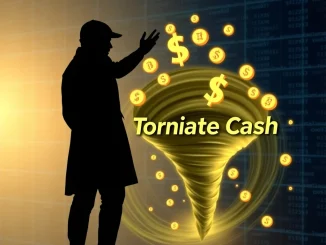
The legal battle surrounding privacy tools in the cryptocurrency space continues to intensify. News broke recently that the U.S. Department of Justice (DOJ) is moving ahead with its high-profile case against Roman Storm, a co-founder of the popular crypto mixer service, Tornado Cash. This development sends a significant signal to the broader crypto community, particularly those involved with decentralized finance (DeFi) and privacy-enhancing technologies.
What Charges Does Roman Storm Face?
Roman Storm stands accused of serious federal crimes related to his alleged involvement with Tornado Cash. The core charges against him include:
- **Money Laundering Conspiracy:** Alleging that Tornado Cash was used to launder illicit funds.
- **Sanctions Evasion Conspiracy:** Accusing Storm of facilitating transactions that violated U.S. sanctions.
- **Operating an Unlicensed Money Transmitting Business:** (This charge was *dropped*, a notable point in the case).
The prosecution argues that Storm, as a developer and co-founder, was aware of and facilitated the use of Tornado Cash by malicious actors, including state-sponsored hacking groups and cybercriminals.
A Closer Look at the Tornado Cash Controversy
Tornado Cash is a decentralized protocol designed to improve transaction privacy on the Ethereum blockchain. It works by pooling together cryptocurrency from many users, mixing it, and then allowing users to withdraw their funds to a new address. This process makes it difficult to trace the origin of the funds. While proponents argue it’s a vital tool for financial privacy, critics, including the DOJ and the U.S. Treasury Department, argue it has become a preferred tool for criminals seeking to obfuscate the origins of stolen or illicit funds.
In 2022, the U.S. Treasury Department’s Office of Foreign Assets Control (OFAC) sanctioned Tornado Cash, adding it to the Specially Designated Nationals (SDN) list. This made it illegal for U.S. persons to use the service. The subsequent arrests of individuals like Roman Storm and Alexey Pertsev (another developer, convicted in the Netherlands) highlight the government’s aggressive stance against services perceived as enabling financial crime, even if they have legitimate privacy use cases.
Why Was the Unlicensed Money Transmitter Charge Dropped?
An interesting turn in the case is the DOJ’s decision to drop the charge related to operating an unlicensed money transmitting business. This move reportedly aligns with guidance from the Financial Crimes Enforcement Network (FinCEN), which has historically distinguished between services that merely provide software or technology and those that act as intermediaries handling funds. The dropped charge suggests the prosecution may be focusing more heavily on the *use* of the service for illicit purposes and the developers’ alleged knowledge or facilitation of that use, rather than classifying the protocol itself or its developers as traditional money transmitters under FinCEN rules. This could have significant implications for how decentralized protocols are regulated moving forward.
What About the Free Speech Defense?
Roman Storm’s legal team had previously attempted to argue that developing and publishing code, such as that for Tornado Cash, is a form of free speech protected by the First Amendment of the U.S. Constitution. This defense posits that code is expressive and should be treated similarly to other forms of protected speech. However, the court has reportedly rejected this defense for the purposes of dismissing the charges, indicating that the prosecution’s allegations involve conduct (allegedly facilitating illicit transactions) that falls outside the scope of simple expressive speech protection.
When Will the Roman Storm Trial Begin?
According to reports, the trial for Roman Storm is set to commence within the next two months. This sets the stage for a potentially landmark case that could have far-reaching implications for developers of decentralized applications, particularly those focused on privacy. The outcome will likely provide more clarity (or perhaps create more questions) regarding the legal responsibilities of developers whose code is used by bad actors.
Challenges and Implications
This case presents significant challenges for both the prosecution and the defense. For the prosecution, proving that Storm had the requisite intent or knowledge regarding the specific illicit uses of a decentralized, permissionless protocol like Tornado Cash could be complex. For the defense, navigating the intersection of code development, privacy rights, and financial regulation in a rapidly evolving technological landscape is a formidable task.
The implications extend beyond Roman Storm himself. A conviction could set a precedent that makes developers legally liable for how their decentralized tools are used, even if they have no direct control over the transactions. This could stifle innovation in privacy-preserving technologies and DeFi. Conversely, an acquittal might embolden developers but could also be seen by regulators as a green light for illicit activity facilitated by such tools.
Summary
The DOJ’s decision to proceed with the trial against Roman Storm, a key figure behind Tornado Cash, marks a critical moment in the ongoing tension between financial privacy, decentralization, and regulatory enforcement in the crypto world. Facing serious charges including money laundering and sanctions evasion, Storm’s case highlights the legal risks associated with developing tools that can be exploited by criminals. The dropped charge related to unlicensed money transmission offers a slight nuance, potentially focusing the case more on alleged facilitation of crime rather than the nature of the software itself. As the trial approaches, the crypto community watches closely, understanding that the outcome could significantly shape the future legal landscape for decentralized applications and privacy tools.



